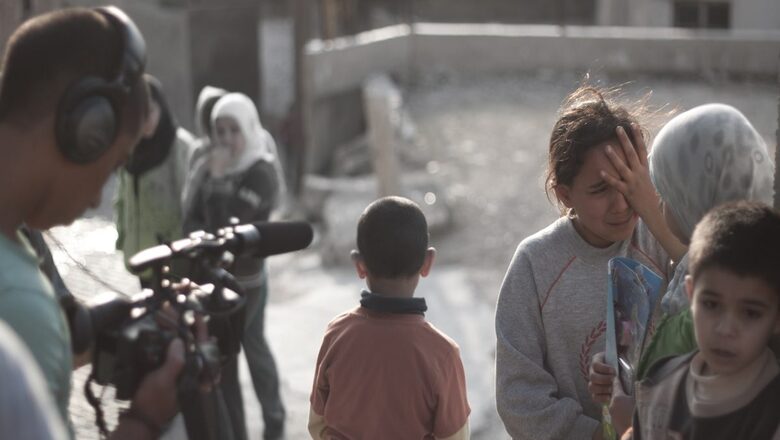
views
War news, with its painful stories, graphic imagery, and devastating consequences leaves an indelible imprint on Indian society. In today’s interconnected world, war coverage and visuals have become increasingly accessible, impacting the psychological well-being of Indians. It is crucial to shed light on the often-overlooked consequences of war news on the mental health of Indians, exploring its effects on adults and the vulnerable minds of children.
Amidst the recurring global conflicts and warfare, it is important to take cognisance of the far-reaching consequences of war coverage and visuals on individuals and our society. The constant exposure to news and visuals of these conflicts can evoke feelings of fear, anxiety, and a sense of insecurity among the Indian population, particularly those who have a personal connection or sense of solidarity with the affected regions.
India, a country with a history of conflicts and ongoing geopolitical tensions, has its own set of unique experiences when it comes to war news and coverage. The nation has faced various conflicts, including the ongoing border tensions with Pakistan and the insurgency in Jammu and Kashmir. Recently, the ongoing Israel-Palestine conflict and the insurgency in Manipur have also had a profound impact on the psyche of Indians. The Israel-Palestine conflict, with its history of violence and territorial disputes, has garnered significant attention in India. The conflict resonates with many Indians due to historical and cultural ties with the region and a sense of empathy towards the suffering of people, as the viewers feel transported to the ground of the conflict. The continuous news coverage and graphic imagery of the conflict can evoke strong emotional responses among Indians, ranging from anger and frustration to feelings of helplessness and despair. Similarly, the insurgency in Manipur has impacted the psyche of Indians, particularly those in the Northeast region. The constant exposure to news about violence, human rights abuses, and the loss of innocent lives can create a sense of fear, anxiety, and a feeling of being caught in the crossfire of conflict.
The impact of war news and coverage in India goes beyond emotional responses. There are also tangible consequences on the mental health and well-being of individuals. According to a study conducted by the Indian Journal of Psychiatry, continuous exposure to graphic war coverage can desensitise viewers over time. The sheer volume of violent imagery can numb our senses, making it harder to empathise with the suffering of others. This erosion of empathy can have far-reaching consequences, as it diminishes our ability to connect with the human experiences of those affected by war, undermining the value and sanctity of human life. Research also shows that repeated exposure to traumatic events through media can lead to the development of secondary trauma, similar to the symptoms of Post-Traumatic Stress Disorder (PTSD).
Furthermore, the psychological impact of war news is distressing for adults in India. The psychological toll of war coverage can manifest in anxiety, depression, sleep disturbances, and intrusive thoughts, affecting the mental well-being of individuals across age groups and strata. According to a survey conducted by the Indian Psychiatric Society, over 60 per cent of Indian adults reported experiencing heightened levels of anxiety, stress, and trauma due to continuous exposure to graphic images and distressing narratives of war. The constant influx of distressing information can create a sense of helplessness and despair, eroding individuals’ mental resilience. Furthermore, the uncertainty and fear generated by war news can lead to increased levels of paranoia, social withdrawal, and a loss of trust in others.
The psychological impact of war news is particularly distressing for children in India. Their developing minds are more vulnerable to the emotional and psychological consequences of exposure to violence and graphic imagery. War news can induce fear, anxiety, and a sense of insecurity in children, disrupting their sense of safety and stability. Witnessing the suffering of others through news coverage can lead to feelings of paranoia, intense fear, sadness, and nightmares. Prolonged exposure to war news can also hinder their cognitive development, emotional abilities, and ways of communication, impairing their ability to concentrate, learn, and form healthy relationships.
The impact of war news and coverage in India is not limited to the emotional and mental well-being of individuals. It also has societal implications. War coverage can be manipulated to serve political agendas, resulting in biased narratives and distorted realities. The deliberate use of graphic visuals can be employed as a tool of propaganda, further exacerbating the psychological impact on viewers. This constant bombardment of sensationalised imagery can skew Indians’ perception of reality, fuelling existing fear, paranoia, and heightened aggression.
While it cannot be denied that war coverage plays an essential role in informing the public and holding authorities accountable, it is also crucial to strike a balance between responsible reporting and protecting the mental well-being of Indians. Media organisations have a responsibility to exercise caution when disseminating graphic visuals, considering the potential harm they may inflict on vulnerable audiences. Ethical guidelines, including trigger warnings and age restrictions can be implemented to mitigate the psychological impact on viewers.
Additionally, the media industry, governments, and caregivers should take up their shared responsibility to protect the mental well-being of individuals, particularly children, in the face of war news. Governments should invest in mental health support services, ensuring access to counselling and therapy for those affected by war news. Caregivers play a vital role in monitoring and moderating children’s exposure to war news, engaging in open conversations, and providing a safe space for them to express their emotions. In addition to protecting mental well-being, it is essential to promote resilience and coping strategies for individuals exposed to war news. Acknowledging the psychological toll of war coverage, it is imperative to invest in mental health support and resources for Indians affected by the visuals of conflict.
Encouraging healthy coping mechanisms, such as engaging in physical activity, practicing mindfulness, and fostering social connections, can help mitigate the psychological impact. Educating adults and children about media literacy and critical thinking skills can empower them to navigate war news responsibly and discern fact from fiction. Governments, NGOs, and media organisations should collaborate to provide counselling services, raise awareness about the potential psychological consequences, and promote resilience-building strategies. Additionally, fostering a sense of hope, solidarity, and empathy can counterbalance the distressing narratives, promoting mental well-being in the face of adversity.
The impact of war coverage and visuals on the Indian psyche cannot be understated. It is imperative that we recognise the silent battle being fought within the minds of individuals exposed to graphic imagery and distressing narratives. As a society, we must recognise the need for responsible reporting while also fostering empathy and understanding for those affected by conflict. By promoting ethical standards, raising awareness, prioritising mental health support, protecting children from excessive exposure, and promoting resilience and coping strategies, we can mitigate the psychological trauma and toll inflicted by war coverage.
Prof of Eminence (Dr.) Sanjeev P. Sahni is the Vice President of the World Society of Victimology. He is also the Founder and Principal Director at Jindal Institute of Behavioural Sciences (JIBS). Views expressed in the above piece are personal and solely those of the author. They do not necessarily reflect News18’s views.




















Comments
0 comment